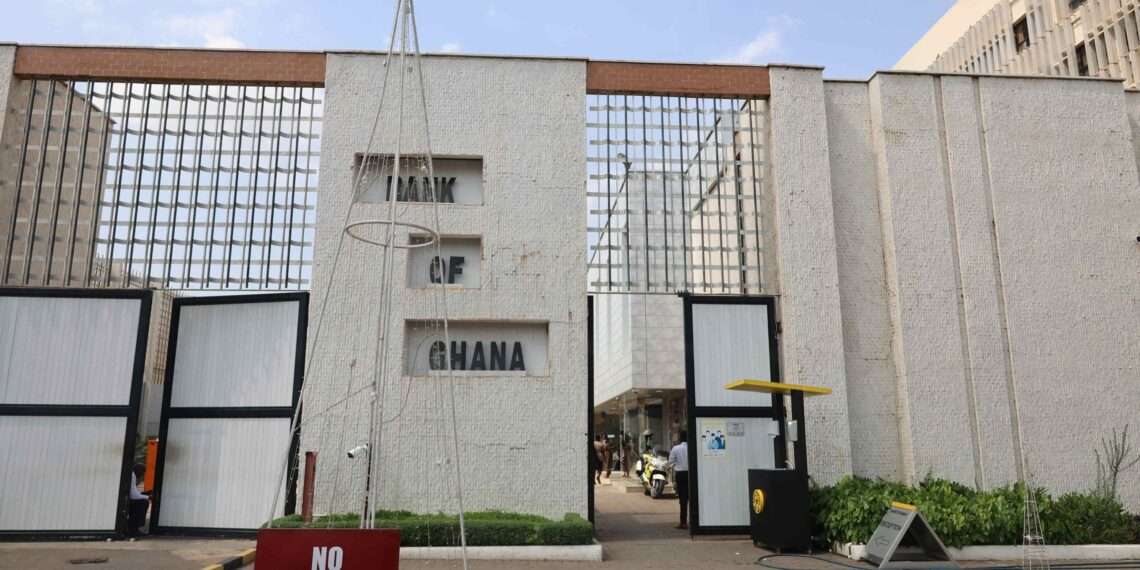Fitch Solutions, a leading global research and analytics firm, has published a report forecasting a 200 basis points (bps) cut in the Bank of Ghana’s (BoG) benchmark policy rate by November 2024.
This anticipated reduction would bring the policy rate from the current 29% to 27%, according to the report. The forecast comes amid persistent inflationary pressures and recent economic developments in Ghana.
At the most recent Monetary Policy Committee (MPC) meeting on July 26, the BoG decided to maintain the policy rate at 29%. This decision was largely driven by concerns over inflation, exacerbated by the weakening of the cedi and rising fuel and utility prices.
Despite the pressure to ease monetary policy, the central bank opted for a cautious approach, citing uncertainties in the inflation outlook. This stance aligns with Fitch Solutions’ expectations, although the research agency has adjusted its year-end forecast upward from 25% to 27%.
Fitch Solutions’ report provides a comprehensive analysis of the factors influencing the BoG’s policy decisions. The report suggests that while inflationary pressures are likely to persist, they are expected to ease over the coming months.
Fitch projects that inflation will fall below 20% by September, aided by favorable statistical base effects rather than significant improvements in supply and demand dynamics. In June, month-on-month inflation stood at 2.9%, indicating that the decline in inflation is not yet driven by a substantial shift in economic fundamentals.
A key factor in the Inflation forecast is the anticipated stabilization of the cedi. The report notes that Ghana initiated the restructuring of its eurobonds in June, with an expected conclusion by September. This restructuring is expected to boost investor confidence, leading to stronger demand for the cedi.
Cedi Could Recover Some of the Losses
As a result, the cedi could recover some of the losses incurred earlier in the year, mitigating inflationary risks. This anticipated currency stabilization provides the BoG with the necessary conditions to consider a rate cut in November.
However, Fitch Solutions does not expect an immediate policy rate cut at the BoG’s next MPC meeting in September. The research agency cites two main reasons for this prediction. Firstly, despite the expected decline in inflation, underlying price pressures are likely to persist.
The agency projects consumer price growth to moderate to 20.7% year-on-year in August, down from 22.8% in June. Nonetheless, this rate remains above the level that central bank policymakers would find comfortable.
Continued exchange rate weakness and rising food prices are expected to keep inflation elevated, discouraging a premature rate cut.
Secondly, Ghana’s robust economic activity reduces the need for a more accommodative monetary policy stance. The country’s real GDP growth surged to 4.7% year-on-year in Q1 2024, up from 3.8% in Q4 2023, marking the fastest economic expansion in over two years.
This growth has been driven by strong domestic demand, with solid growth in private consumption and robust fixed investment. The Q2 economic growth figures, expected to be released before the September MPC meeting, are anticipated to surpass the BoG’s full-year forecast of 3.7%. The sustained strength in domestic demand diminishes the urgency for a rate cut.
While Fitch Solutions predicts a 200bps cut in the BoG’s policy rate by November, the timing of this adjustment will likely depend on the evolution of inflation and economic activity.
The agency expects the BoG to adopt a cautious stance in the short term, maintaining the policy rate at 29% through September. However, assuming that inflation continues on a downward trajectory and the cedi stabilizes, a rate cut in November appears probable. This forecast underscores the complex interplay between inflation management and economic growth in the BoG’s policy considerations.
READ ALSO: NDC’s Omane Boamah Rejects August 4 Holiday





















